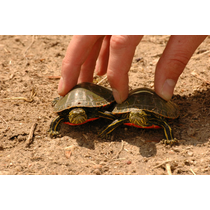
Current Notices
The grant supporting RUTE has ended. The RUTE program is no longer active.
What is RUTE?
Critical questions in contemporary biology increasingly require mathematical analyses for their answers; however, there is a shortage of biologists with sufficient training in mathematics and mathematicians with sufficient training in biology to master this interdisciplinary work. The Department of Mathematics, the School of Biological Sciences and the School of Natural Resources are cooperating to address this issue at a variety of levels. Currently, the RUTE program consists of a spring course and summer research program.
Co-directors
Glenn Ledder, Department of Mathematics,
,
402-472-7382
Chad Brassil, School of Biological Sciences,
,
402-419-0076
The RUTE Scholars Program
a research-based experience

The RUTE Scholars program is a structured research program for teams of undergraduate students and faculty mentors. The program has successfully introduced students to research at the interface of mathematics and biology for the past 5 years. The structure for this final year of the program will differ somewhat from past years. Team size and composition will vary depending on the needs of the research question. Projects will include roles for biology or natural resources students and mathematics students. Mentors will include faculty from biology or natural resources and mathematics. Most projects will initiate after the spring semester is completed and run full-time all summer, although some projects will overlap with the semester because of the schedule of the biological populations involved. Participants must be UNL students and U.S. permanent residents or citizens.
The application deadline for the 2011 spring course tution scholarship is October 19, 2010: Application instructions.
Project descriptions for 2011.
The program is structured around a spring course and a summer research experience:
- Spring: You will take a 3-credit course on Case Studies in Theoretical Ecology (MATH/BIOS/NRES 316) in which you will study the biological and mathematical principles needed for the research questions. You will produce a research proposal for a summer research project.
- Summer: Based on the research proposals, scholarships will be awarded to conduct research on one the identified projects. Projects may include collecting field data, analyzing data, and/or mathematical modeling.
Two scholarships are available: one for the course and one for the summer research. The course scholarship will cover the 3 credits of tuition for the spring course. The summer scholarship will provide a stipend of $4200 for the summer to enable students to devote their efforts to the project full-time for the duration of the summer. Additional benefits include a structured introduction to research in ecology and mathematical modeling along with a close mentoring relationship with faculty at UNL.
Funded by the National Science Foundation